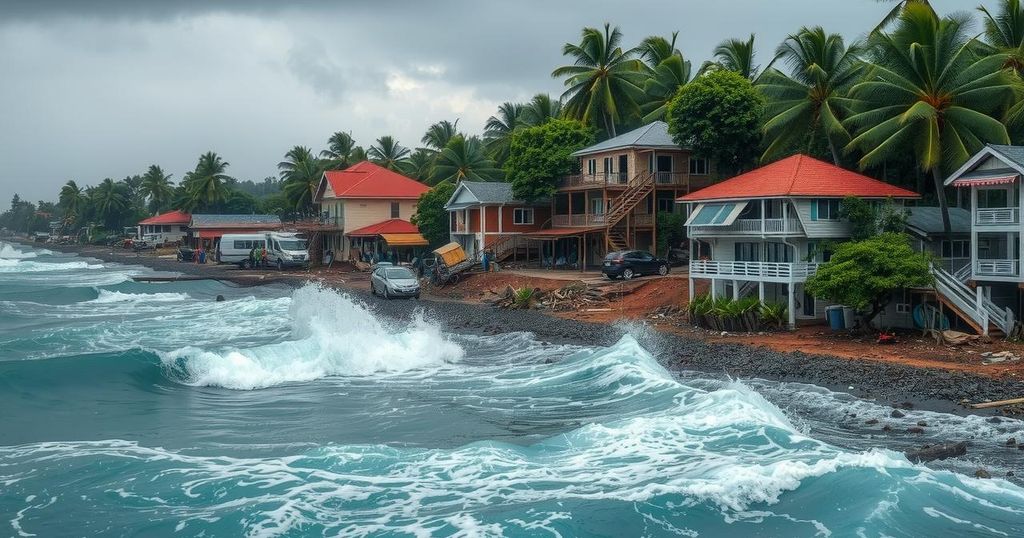Cyclone Chido Devastates Mayotte Amid Growing Climate Change Concerns

Cyclone Chido has struck Mayotte, marking the territory’s most intense storm in 90 years, resulting in at least 22 fatalities and widespread destruction. Climate change, particularly rising sea temperatures, is intensifying cyclonic activity in the region. The lack of weather tracking infrastructure exacerbates the situation, underscoring the need for better early warning systems to protect vulnerable communities.
The Indian Ocean archipelago of Mayotte is grappling with the aftermath of Cyclone Chido, which is recognized as the most intense storm to impact the French territory in nearly a century. Following its landfall on Saturday, at least 22 fatalities have been confirmed, alongside extensive destruction across neighborhoods, critical infrastructure, and widespread uprooting of trees. The increased frequency and severity of cyclones in this region have been attributed to human-induced climate change, according to climate scientists.
The cyclone season in southeast Africa typically spans from December to March, a period coinciding with peak oceanic temperatures. This seasonal alignment, wherein the warm waters fuel cyclonic activity, has led to numerous catastrophic storms over recent years, including Cyclone Freddy in 2023 and Idai in 2019, which have severely affected countries such as Malawi, Mozambique, Zimbabwe, and Madagascar. In this context, it is important to note that the terminology for these storms varies, as they are termed hurricanes in other parts of the world.
Climate change significantly exacerbates cyclone conditions, notably through rising sea temperatures resulting from the combustion of fossil fuels. The Earth has warmed by 1.3 degrees Celsius (2.3 degrees Fahrenheit) since pre-industrial times, raising ocean temperatures to record levels. Cyclone Chido drew its strength from water temperatures that reached nearly 29 degrees Celsius. Consequently, warmer waters lead to more powerful cyclones characterized by fierce winds, intense rainfall, and heightened storm surges.
The lack of early warning systems across much of Africa poses an additional challenge in preparing for such extreme weather. There is a considerable deficiency in weather tracking infrastructure, with only 37 radar facilities available on the continent compared to Europe’s 347 and North America’s 291. This scarcity hinders timely evacuations and preparedness efforts, resulting in higher mortality rates in the face of devastating storms. For instance, the death toll from the 2019 Idai cyclone went beyond 1,000. In response to this pressing issue, the U.N. has initiated a global project to provide comprehensive early warning systems within the next five years, emphasizing the necessity for enhanced weather predictions in line with climate adaptation efforts.
Cyclone Chido has struck Mayotte, leading to significant loss of life and property damage. This event is emblematic of a larger trend of increasing cyclonic activity in southeastern Africa, attributed largely to climate change. As sea temperatures rise due to human activities, the potential for more potent storms increases, raising concerns for vulnerable communities lacking adequate forecasting systems. The impact of climate change on cyclones represents both an environmental challenge and a public safety crisis, necessitating immediate attention and action.
Cyclone Chido has starkly illustrated the human and infrastructural costs associated with increasingly intense storms in the context of climate change. The devastating effects on Mayotte serve as a reminder of the urgent need for improved weather tracking and early warning systems across Africa, as well as the importance of addressing climate change to mitigate future risks. The looming cyclone season in the region necessitates proactive measures to safeguard affected communities, reinforcing the critical nature of international cooperation and adaptation strategies.
Original Source: www.seattletimes.com







